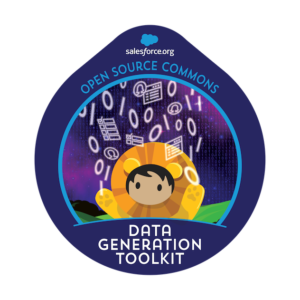For a little over two years I’ve had the privilege of helping lead the Data Generation Toolkit Project for Salesforce. In general, Open Source projects are not known for their inclusive and supportive communities. I believe it is fair to say our project demonstrates that building a supportive community can yield great results.
Started by a question I wrote on a piece of paper in 2019 and posted to a wall, the project grows more every time I look around. That first meeting inspired the creation of Snowfakery and the recent training for Snowfakery has attracted more than 300 registrants. Contributors created documentation and presentations to help Salesforce admins learn to seed sandboxes. We are building a recipe library to help people starting out on Snowfakery. We launched two faker data providers. This year we reviewing and documenting other tools to generate and move Salesforce data.
More importantly we’ve built a project that is useful to the community, and supports new contributors to open source projects.
We did not get here accidentally. The project leadership wants to support the community members as much as create new tools. From the beginning we chose to encourage people unfamiliar with open source projects, contributions, and technologies.
Leading an Supportive Open Source Project
To be a supportive project starts with the leaders.
The project currently has seven identified leaders: Alisa Edwards, Allison Letts, Jung Mun, Paul Prescod, Samantha Shain, Cassie Supilowski, and myself. For those who like diversity statistics: that can be seen as 5 women, 2 men, 3 countries of residence, 3 counties of origin (not the same 3), 3 developers, 4 Salesforce admins, and at least 3 racial identities. No sub-group perfectly reflects its community, but that’s not a bad start in my opinion.
We have agreed that some of us lead specific sub-projects, while others tend to the health of the community. Everyone has a role.
When we started out with just 4 leaders either Paul (as creator and maintainer of Snowfakery) or I (as the person who started the project) could have dominated the project claiming founder status. Certainly men leading other open source projects have used that status to control the project direction. But Salesforce Open Source Commons projects are designed to discourage that behavior, and Paul and I embraced that design. Cori O’Brien created a wonderful space for our project to grow within.
Any open source project should focus on supporting its users. Our goal as a project is to support the Salesforce community – particularly nonprofit and education users. To do that we need the insights that only come from being open to outside ideas.
Our project’s leadership also established a pattern of self-review and reflection. Each year we will gather to discuss if the leadership group is the right size, and if anyone needs to step down. That creates a space for us to routinely reflect on what we’re doing and if we’re doing it well. The invitation to leave frees people from responsibilities they have to the project without frustration or burn out.
Recipes for Open Source Projects
Beyond our leadership team structure we also are intentional about how we encourage all contributors.
The project as a whole has space for all kinds of contributions. If someone wants to write documentation we will support them. When someone wants to learn to write recipes, we will work in pairs to get through the first one. People who want to write Python code for our faker providers get the chance to do that too.
We try to be kind to all contributors. We thank everyone when they open pull-requests or issues. Even I get thanked when I open a PR. Even if someone needs to make significant changes to a contribution before we commit it, we make sure to praise their effort.
These aren’t shit sandwiches. We genuinely appreciate all contributions and divorce that from any corrections that we request. As a long time open source contributor I am surprised at how much I appreciate the messages.
Maintaining Supportive Discussion Channels
Most open source maintainers know we have to maintain good ways for contributors to ask questions. Over time projects have used a wide variety of tools: IRC, News Groups, Email, issue trackers, and now Slack. In most projects those are the spaces that tend to become ugly. You see RTFM-style answers, personal criticisms, identity-based attacks, and other ugliness. The Slack channels for our project are a key piece of how we engage with each other, and support new contributors. We work hard to make sure people get timely answers, clear directions, and steady encouragement.
Our work falls within a community where our reputations matter and so there is a level of decorum absent in some open source projects. But no group is perfect and we will address issues when they arise. The open source common’s DEI Framework project will hopefully help us continue to deepen our understanding of the community. The kinds of attacks open source community spaces frequently allow in the name of good code, are simply unacceptable.
Come Join Us
The next community sprint for our project is coming up May 4th & 5th.
